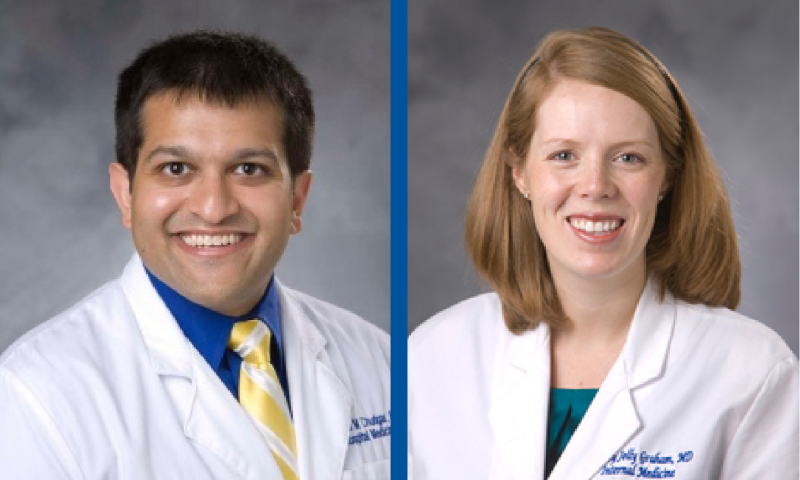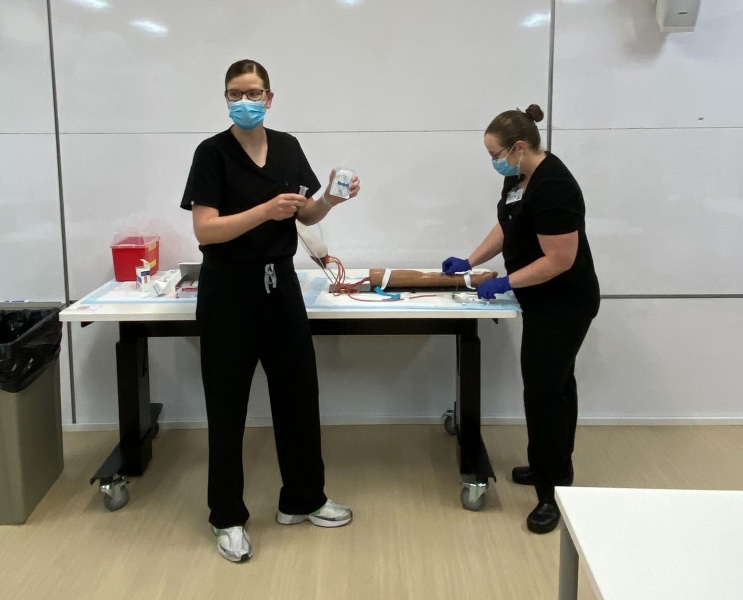
The transition between pre-clinical and clinical education is often challenging for medical students. This is the ninth straight year Dr. Saumil Chudgar and Dr. Aubrey Jolly Graham have led the Clinical Skills Intensive (CSI), a 3-week full-time course that helps to prepare new second-year medical students for their clinical education.
"The course lays the foundation for students' clinical rotations by teaching essential clinical skills including ECG and lab interpretation, procedures, patient safety, differential diagnosis, diagnostic testing, clinical reasoning, evidence-based medicine, and diagnosis-based physical examination," explains Chudgar.
 2020 - the year of going virtual yet interactive
2020 - the year of going virtual yet interactive
Due to the COVID-19 pandemic, most of what this course usually teaches in-person switched to an online format.
"Admittedly, the transition to the virtual year presented a new challenge for us," said Chudgar. "Most of the sessions were transitioned to Zoom."
The instructors presented large group lectures live via Zoom. Special functionality of Zoom easily facilitates breakout rooms, polling, and a chat feature to make the lectures more interactive.
Special permission for in-person sessions
The course obtained special permission from the School of Medicine and the University to have one set of sessions in-person. These were sessions where the students practiced procedures such as arterial blood gases, nasogastric tubes, and intravenous lines on task trainers.
"Because these were tactile skills and the students needed to use the equipment and learn the techniques, these had to be done in person," says Chudgar.
To help keep everyone safe, the group was sure to take special precautions including strict hand hygiene, universal masking, and social distancing. There were also limits placed on the number of people in a given room based on the size of the room. Students rotated in small groups at different times throughout the day.
Benefits of year-long small groups
Approximately 120 students participate annually in the CSI course. Besides these 3 weeks at the start of the clinical year, small groups continue for two hours every other week. In this manner the students can apply the skills they are learning to more challenging problems gained with ongoing clinical experience. Each group has an assigned faculty instructor and a third-year medical student as a co-leader. The third-year students benefit from faculty mentoring as future clinican-educators.
"One of the exciting things over the last 9 years is the caliber of our students," says Chudgar. "All the faculty are blown away each year at how much they know and how eager they are to learn."
Faculty Involved in Course:
- Saumil Chudgar, MD - Course Director (GIM/DUH Hospital Medicine)
- Aubrey Jolly Graham, MD - Course Associate Director (GIM/DUH Hospital Medicine)
Small Group Leaders:
- Mitchell Black, MD (GIM/DUH Hospital Medicine)
- Joel Boggan, MD (GIM/VA Hospital Medicine)
- Aimee Chung, MD (GIM/Medicine-Pediatrics)
- Alison Clay, MD (Pulmonary/Critical Care)
- James Fox, MD (Pediatric Emergency Medicine)
- Jane Gagliardi, MD (GIM/Medicine-Psychiatry)
- David Gordon, MD (Emergency Medicine)
- Elizabeth Hankollari, MD (GIM/DUH Hospital Medicine)
- Brian Kincaid, MD (GIM/Medicine-Psychiatry)
- Nancy Knudsen, MD (Anesthesiology/Critical Care)
- Cara O’Brien, MD (GIM/DUH Hospital Medicine)
- Cecily Peterson, MD (GIM/DPC Pickett Road)
- Jenny Van Kirk, MD (GIM/DUH Hospital Medicine)
- Nancy Weigle, MD (Family Medicine)